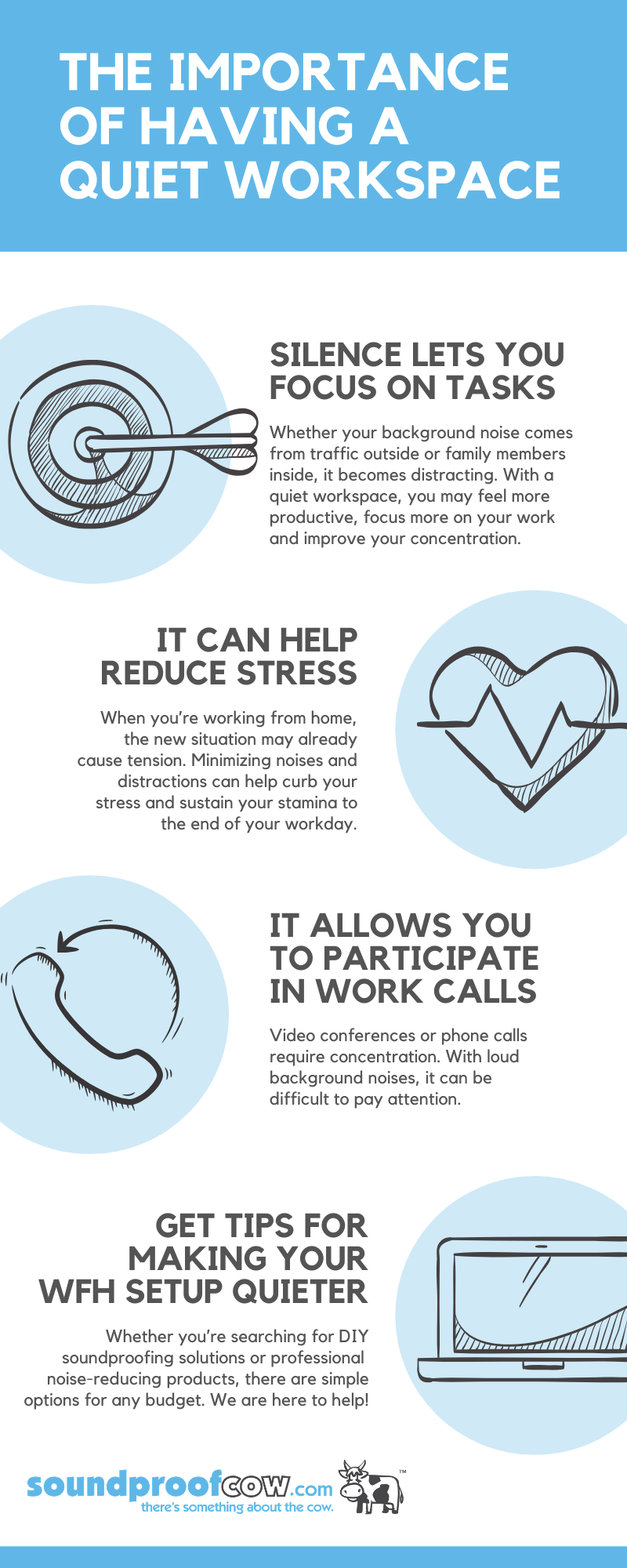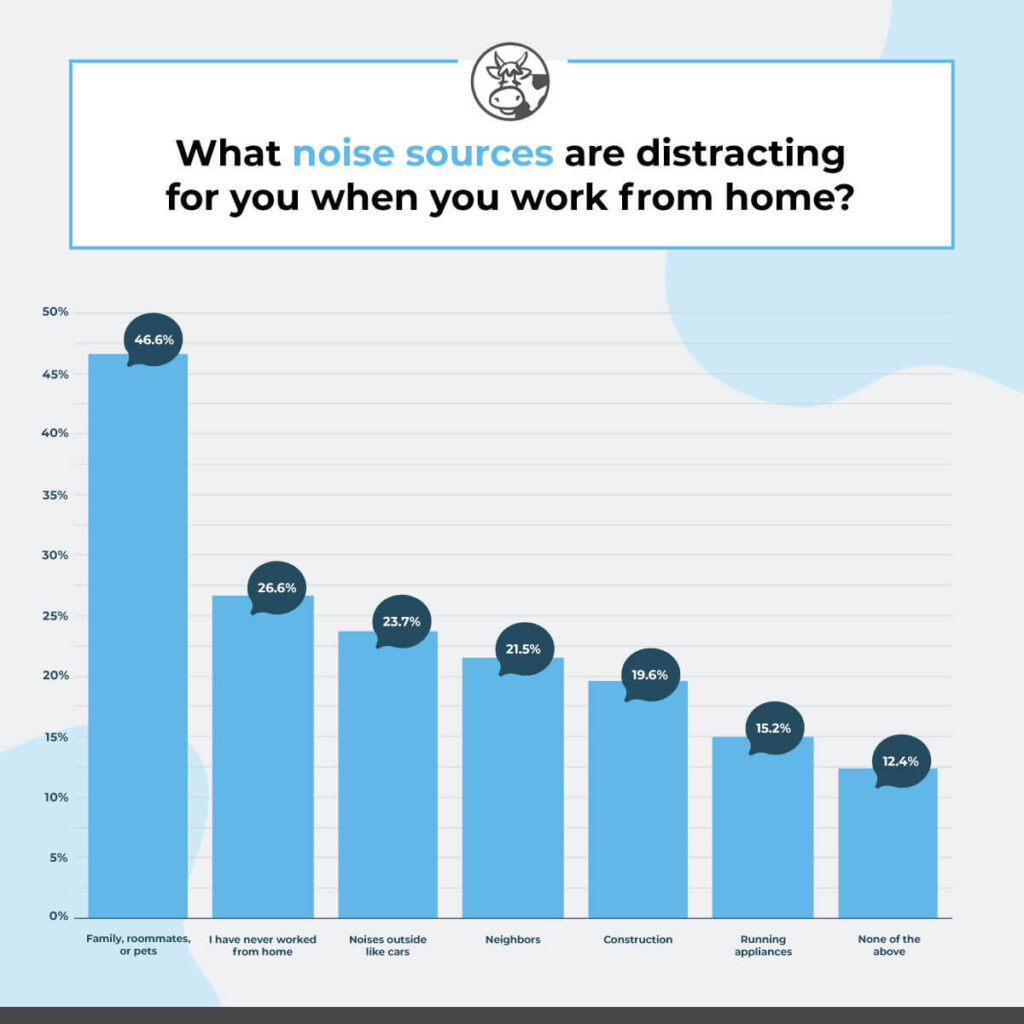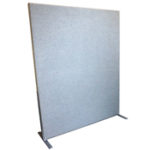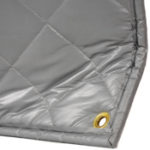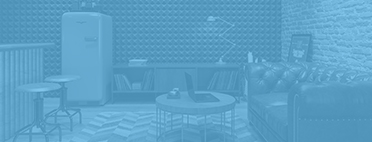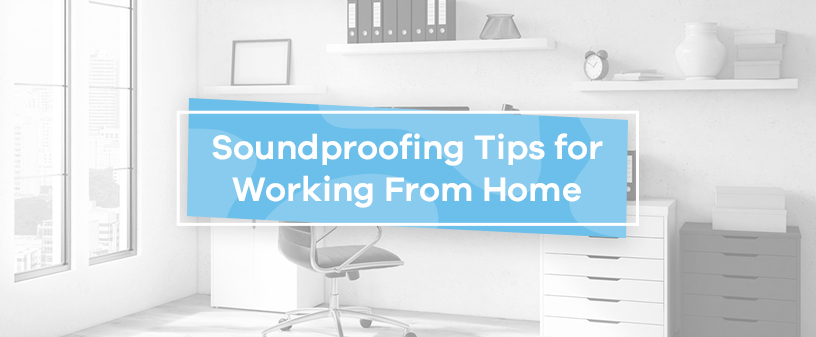
If you find yourself working from home suddenly, it can be quite an adjustment. New routines, new setups and entirely new situations can be intimidating. As you transition into a new workflow, you can take small steps to alleviate stress from your remote workday with a soundproof home office or workspace at home.
To get the best noise reduction for your office space and reduce background noise when working from home, you want affordable yet effective soundproofing materials. In this guide, we’ll provide soundproofing tips for working from home and ways to stay focused in your new environment. Whether you’re searching for DIY soundproofing solutions or professional noise-reducing products, there are simple options for any budget.
The Importance of Having a Quiet Workspace
If you’ve worked in a noisy office before, you know how challenging it can be to deal with sounds when you’re trying to focus. Coworkers chatting, bosses asking for updates and other office noises can distract you at work. When you’re working remotely, you can face similar noise levels from different sources — whether you have kids home from school, pets needing attention or a significant other who’s also working remotely. Eliminating these noises or reducing them with soundproofing solutions could help you:
- Focus on tasks: Whether your background noise comes from traffic outside or family members inside, it becomes distracting. You may find yourself wondering what’s happening or even leaving the room to see the source of the loud noises. With a quiet workspace, you may feel more productive, focus more on your work and improve your concentration.
- Reduce stress: Loud noises may generate stress or other physical reactions that could impact your concentration and health. When you’re working from home, the new situation may already cause tension. Minimizing noises and distractions can help curb your stress and sustain your stamina to the end of your workday.
- Participate in work calls: Video conferences or phone calls require concentration. With loud background noises, it can be difficult to pay attention. While you could mute your end of the line, it’s best to take control of your space and make yourself look more professional.
Though transitioning out of the office can be difficult, remind yourself that working from home has some inherent advantages. In a larger office, you may contend with the sound of others typing, talking, printing, walking around and more. When you’re working from home, you have more control over the situation. You can ask those in your household to respect your work hours so you can concentrate. You may also have more freedom to soundproof your home office, whether with professional products or DIY setups, to reduce noise in your workspace.
What Are the Biggest Noise Distractions When Working From Home?
With remote work growing in prominence all around the world, people are beginning to notice common distractions. We asked 1,552 participants if they have experience working from home and which noise sources are the most distracting when they do. Of the 1,552 responses, 73.4% had worked from home before.
The following were the most common distracting noise sources among all participants:
- Family, roommates or pets: 46.6%
- Noises outside like cars: 23.7%
- Neighbors: 21.5%
- Construction: 19.6%
- Running appliances: 15.2%
- None of the above: 12.4%
So, what can we glean from this study? It seems that noise bothers remote workers from both inside and outside their homes, meaning it’s necessary to soundproof their home office if they want to focus on their work. The data show that over half of the most common noise distractions come from within the worker’s home. Two responses — family, roommates or pets and running appliances — account for 61.8% of responses. Additionally, 64.8% of participants were distracted by outside noise sources like neighbors, cars and construction.
Addressing Noise From Roommates, Family Members and Pets
Communicate with your roommates or family members so they know when you need some quiet time to focus on work. As for pets, be sure to give them enough attention before and after work so they have everything they need to relax on their own during working hours.
After ensuring those around you give you as much quiet time as possible when you need it, you’ll also want to work in an isolated location. Set up your workspace as far away from the people or pets creating noise as you can so the sound has to travel further to reach you.
If sound still makes its way into your home office, these soundproofing materials can help with noise reduction:
- Mass-loaded vinyl (MLV): Adding mass to a surface like a wall or a door makes it harder for sound to pass through. MLV sheets fortify any sound barrier.
- Acoustic foam panels: Installing acoustic foam panels onto your door or walls can also prevent sound from passing through.
- Door sweeps: A door sweep will fill the crack between the door and floor so sound can’t make its way under.
Addressing Noise From Outside Your Home
Many of our survey’s participants noted outside noise as a major distraction. Anything from the neighbors in your apartment complex to construction outside or cars driving by can distract you while you work. As with noise coming from inside your home, it’s best to set up your workspace as far from outdoor distractions as possible. Position your desk along the farthest wall from the road or your neighbors.
After creating some distance, try using soundproofing materials to prevent noise from entering your home. Materials like MLV, acoustic panels and door sweeps serve similar functions when stopping outdoor noise as they do for indoor noise. Filling your walls with acoustic insulation is another effective tactic for preventing sound transmission.
How to Soundproof a Shared Home Office
Sharing a home office with someone has its benefits and shortcomings. People thrive in different situations, often resulting in a certain level of conflict. For instance, you might prefer a quiet and relaxed atmosphere when working while your office partner performs better in a buzzing and stimulating environment.
Even if the person you’re sharing an office with tries to keep quiet, they are bound to generate noise somehow. The sounds they make can range from taking regular calls to using noisy equipment, like a loud computer keyboard. Either way, your workflow can easily get disrupted under these circumstances. The best way to deal with this situation and ensure you can focus is to soundproof your home office. Here are some shared home office noise reduction techniques you can use:
Add Acoustic Partitions
An acoustic partition or room divider is a portable soundproof wall that you can easily set up to enclose a space, keeping any unwanted sounds out. Adding acoustic partitions is an excellent work-from-home noise reduction method, especially for shared spaces. Once you set up the partitions, you can enjoy working in your own smaller and quieter space.
Acoustic partitions are usually lightweight and portable, so you won’t be making any drastic and permanent changes to your office. Consider lining up several of our Udderly Quiet® Acoustic Partitions to create a divide in your shared office for more privacy and noise reduction. We provide acoustic partitions in a range of colors and styles, enabling you to design a unique space that complements the rest of your office.
Hang Soundproof Curtains
If you aren’t interested in using partitions, curtains are another simple and effective way to separate a large room into two smaller spaces. These temporary soundproofing barriers are good at creating visual division, and they also have fantastic noise-canceling qualities.
You can use curtains for shared office noise reduction by mounting them on a rod to screen the rest of the room off. These curtains will help absorb sound and prevent it from reverberating around the space, effectively dampening noise.
At Soundproof Cow, we provide Quiet Barrier® Acoustic Quilts to help you create a quieter workspace. These products are made of thick and heavy fabric for better soundproofing. Be sure that the length of the curtain you choose goes all the way down to the floor to prevent as much sound from entering as possible.
Ways to Help Stay Focused
Even without sound, it can be tough to stay focused when working from home. There are plenty of new distractions, so try to create a space that allows for deep concentration as you work.
To deal with sound in your home office and stay focused in other ways, try to:
- Minimize distractions: When it’s quiet in your home office, something as simple as a ticking clock can become a distraction. Before working, sit in your workspace and be still for a moment. Listen for any sounds that could become a distraction, like noise from outside traffic or conversations from within your home. In the following sections, we’ll explain some ways you can reduce those distractions with soundproofing.
- Ask others to respect your work hours: Let everyone in your household know that you have to work during certain hours of the day. If you have children, give them activities, schoolwork or chores to do while you work so they can stay on your schedule. If you have to share a workspace with someone else in your home, make sure you both understand you need to be productive.
- Play music: It may seem counterintuitive to add more sound to your space, but sometimes controlled sounds help combat the external noises you can’t control. Playing music, white noise, nature sounds or another background noise can help keep your mind off the distracting noises. Make sure you keep this music at a medium volume — around 70 to 90 decibels (dB) — for the best level of background sound.
- Use noise-canceling headphones: If you work in multiple rooms or a space you can’t soundproof, noise-canceling headphones can function as portable soundproofing equipment. Whether you get headphones that play music and cancel out background sounds or headphones that simply block noise, they can be a big help in home noise reduction. You can even use them back at the office when you’re done working remotely.
- Set up a workspace: If you already have a home office, you may not need to worry about having a dedicated workspace. But if you’ve never worked from home before, you’ll need to create a functional setup. If you can, work from a desk instead of other areas like your bed. This may help you feel more attentive and like you’re at your office. If you don’t have a desk available, use a table instead. A table in your dining room or kitchen may be convenient, but if these rooms are open, they can be difficult to soundproof. Try moving a table into a bedroom or other room with a door you can close.
It may take a few tries to perfect your setup, and that’s okay. Working from home is a new experience for many people, and with inconvenient home circumstances, it’s not always easy. If you find yourself getting distracted while working, pause for a moment and try to relax your mind. Take a moment to evaluate what’s distracting you so you can work to solve the problem.
The DIY Approach to Soundproofing a Home Office
You may not have time to wait for soundproofing products to be delivered to your home. Here’s how to soundproof your home office if you need noise reduction right away. Use items you already have at home for quick office noise reduction with the following tips.
1. Create Thicker Walls
We aren’t talking about a total home remodel here. Instead, you can add items to walls that are thin to prevent sound from coming through. If you notice you can easily hear conversations, music, the television or other noises through a wall, you may want to:
- Use furniture: Bookshelves, cabinets, wardrobes and other furniture items add dimension to your walls and can help block sound. If you can, rearrange your room so these items are against thin walls in your home office. Whether they are against a wall next to the hallway in an apartment complex or a wall adjacent to a family member’s bedroom, these pieces of furniture could help reduce external noise.
- Decorate the walls: Thick blankets or curtains have a soundproofing effect that adds bulk to the walls and helps reduce echoes. You can hang these with strong, removable hooks for easy setup or install curtain rods and other sturdy hooks for something more permanent.
For a more involved fix, you could put up drywall or fill the cracks in your walls with acoustic caulking. However, these solutions aren’t as simple as moving furniture or hanging decorations.
2. Fill a Room
The emptier a room, the more echo you’ll experience. If you have minimalist decor or don’t have a lot of furniture in your home office, you may experience echoing. Every key you hit on your keyboard, each tick of the clock and all the sound that comes from outside your office will feel amplified as the noise bounces off bare walls in the room.
To avoid an echo, try a few of the following:
- Hang paintings and photos.
- Add a rug.
- Display a tapestry or quilt on the wall.
- Bring in useful furniture, like an extra desk or table.
- Add a couch or armchair.
- Stack up blankets or cushions.
- Hang curtains on your windows.
Upholstered surfaces and fabrics help absorb more sound, so focus on adding soft touches to your office. Remember that if you add a place to sit or work, you should try to place the furniture away from a thin or shared wall.
3. Move Your Desk
If you currently have your desk against a shared or external wall, you may want to move it. Sitting near or against a thin wall can make it easier to hear the sounds that come through it. Instead, move your desk to a spot like:
- The thickest wall in your room
- A wall that doesn’t have windows that lead to a noisy road
- A wall that isn’t shared with another room
- The middle of your room
This may be easier for remote workers who only need a laptop or other small devices instead of multiple monitors. If you have several wires or plugged-in devices in your setup, it may be quicker and easier to choose another DIY soundproofing option.
4. Check the Other Room
If your desk needs to stay in place, you still have soundproofing options. Go to the adjacent room and see what’s against or on the wall you’re working near. You may identify sources of sound like:
- A television
- A computer
- Speakers
- Your kids’ toys or play area
If you can, move these items to a different wall or room. This may be challenging for some rooms and items, so you may need to create a rule about noise levels. Ask your family members or housemates not to use the television, computer or other devices in that room until a certain time of day or to use a low volume. You can also use the above DIY soundproofing tips in other noisy rooms to address the situation from outside your home office.
Shop DIY Soundproofing Materials
Soundproofing Products That Are Worth the Investment
Though some soundproofing supplies are more hands-on, like insulation that goes inside walls, many products require a simple installation that can have your home office or workspace ready in no time. These products can be useful now, while you’re working from home, as well as any future occasions when you work remotely or need noise reduction in your rooms. Consider investing in the following soundproofing products to reduce noise in your home office.
1. Acoustic Foam
Acoustic foam products reduce the intensity of sound waves and reverberation, which can cut down echoes in your workspace.
Acoustic foam is one of the most effective and affordable ways to reduce sound clutter. You can find acoustic foam products in various sizes, shapes and colors to fit your room’s decor or blend in with the walls.
Hang acoustic panels on the wall to make walls thicker and help reduce outside noise, and use corner pieces to reduce echo from inside your home office. Acoustic foam products can also help with sound clarity, which is perfect if you’re making calls and joining video conferences. Whether you install your foam with construction adhesive or leave it free-standing for flexibility, it can help reduce noise and create clearer sounds.
2. Fabric-Wrapped Panels
Add a mix of decor and soundproofing with fabric-wrapped panels. These products don’t look like soundproofing equipment, which may be convenient if your workspace serves double duty as a bedroom, guest room or other living space.
Pros of fabric-wrapped panels include the following:
- They come in a variety of sizes to suit any size room.
- They come in a variety of colors to fit your decor.
- They can blend in with your existing wall color.
- They can be installed on walls or ceilings.
- They are lightweight and easy to move around.
You’ll also find panels you can customize with your own pictures. Whether you have a nice family photo or a scenic shot from your travels, you can use it to decorate your home office and reduce sound clutter.
3. Door Seals and Sweeps
If there’s a door in your workspace, you can shut it to block out sound. But it may not provide the noise control you need and you may want to soundproof your door.
Doors are made from thinner material than walls, and the gaps between doors and door frames may allow sound to come through. Door seals and sweeps provide options for doors that are new or old, metal or wood, and on the interior or exterior of your home. Whether you have a large door or something more standard, these products can reduce the gaps around your entryway and help block noise from entering your workspace.
Get Soundproofing Solutions From Soundproof Cow
When you’re working remotely, you want a quiet place to work and focus. Soundproof Cow is here to help answer questions about our products’ features or make recommendations based on the most distracting noises you combat in your home office. We know this is a stressful time, so we want to make the transition to working from home as painless as possible.
Complete our free acoustic analysis or use our soundproofing questionnaire to find out what products may be best for your workspace. For more information, contact us online today or call us at 866-949-9269.



